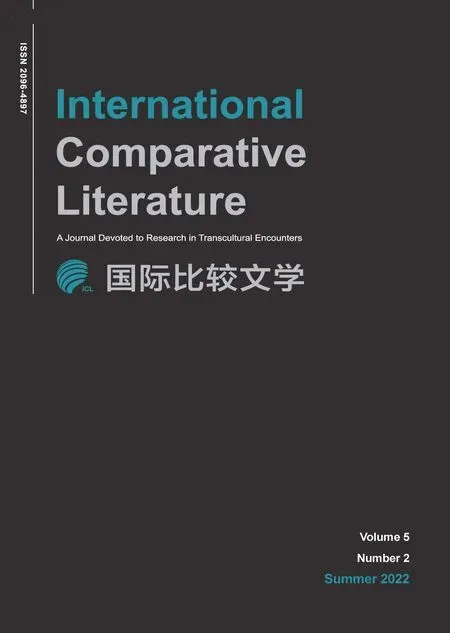WANG Xiaoping. Chinese Literature and Culture in the Age of Global Capitalism:Renaissance or Rehabilitation?
:?is a solid“what-is-going-on”book that is on the cutting edge of its field.The monograph addresses one of the most important questions in contemporary Chinese studies:“Is what is taking place in China a renaissance of(traditional)Chinese culture or a painful rehabilitation or overhaul of its ancient and modern heritages?”In addressing such a vital question,the monograph ambitiously offers a bigpicture vision of Chinese literary history to account for the intersection between postmodern superstructure and its postsocialist reality,a complex contradiction worthy of pondering in China’s age of global capital.
Methodologically,the monograph tests if the complex cultural terrains of contemporary China can be understood within the time-honored cultural materialist framework,which is informed by Raymond Williams,Fredric Jameson,and China’s own socialist intellectual past.To unravel the multiple intellectual trends in post-Mao China,the work creatively applies Raymond Williams’s theory of the“Three Cultures”:the residual,the dominant,and the emergent.The author classifies the literary and artistic works that typify socialist sensibility as the residual,whereas the liberal humanist and the market-logic works are classified as the dominant.Works that reflect the tastes of the newly rising bourgeois class are allocated to the emergent culture.The debate on Chinese identity also belongs to the emergent.The author argues that the true emergent culture,rather than a return to“Chineseness”as found in political Confucianism,should be a renaissance of a new socialist culture that relies on the materialization of the class-consciousness of the Chinese working class.Metacognitively,the method and content of the monograph is reflective of a socialist dialectics,forging an argument on the relevance of cultural materialist analysis.
Content-wise,the monograph offers a diverse range of texts,from avant-garde fiction,new historicist novels,and worker-conscious cinema to the lesser known“Middle-Aged Generation”poetry,to illustrate the persistence of socialism as a residual culture,confronted and succeeded by the dominant and emergent cultures of Western-borrowed humanism,postmodern decadence,spiritually deflated consumerism,and the worthy struggles of the subaltern class.Readers interested in Chinese avant-garde fiction,the new historicist novel,and contemporary cinematic homages to the socialist legacy will appreciate the book’s insightful dialectical reading.Rather than contextualizing avant-garde fiction as formal experimentation derived from Western modernism,the author argues that these texts are brought about by the“budding consciousness of the newly emerging‘middle class’”galvanized by the depoliticization and secularization of post-revolutionary society.Similarly,the author regards the historical novel《白鹿原》(White Deer Plain)as a product of depoliticization in the 1990s,when class analysis was abandoned and human desire was used to explain historical evolution,“substituting the Marxist materialistic view of history(namely,class struggle)with bourgeois notions of history.”
Through reading a diverse array of texts,the work critiques both the dominant culture and the false emergent culture,faulting their representative works on the grounds of using a liberal-humanist perspective to replace class analysis and political-economic analysis,using“pure love”and“universal human nature”to cover up class difference,and using moralistic discourse to dismiss narratives of class struggle.The work also criticizes the renaissance of conservative Confucian culture,also on the grounds of its ahistorical application of“national essence”to contemporary Chinese society,where a renaissance of a new socialist culture that emphasizes equality and justice is more called for.
The work claims that“the predominance of middle-class tastes and debate around Chinese identity”characterize the emergent culture.The former is believed to be a false ideology that feeds on the vested interest of the bourgeois,while the debate around Chinese identity will determine what sort of renaissance China will pursue:either a renaissance that embraces so-called“Chineseness”to“sublate”Western modernity;or a renaissance that calls for a new,socialist alternative to“transcend”capitalist globalization.While deploring the popular linkage of such terms as“rejuvenation”and“revitalization”to China’s ambition to restore its erstwhile glory from the imperial period,the author,through reading literary and cultural texts,argues for a renaissance of socialist culture.
The work excels at highlighting the residual socialist structure of feelings through reading two atypical“Middle-Aged Generation”poets,Franken Chen and Fu Tianhong 傅天虹(1947-).The reader may also desire more case studies on fictional and filmic works that directly illustrate the coming into being of the class-consciousness of the Chinese working class,who are believed to create the real emergent culture.The author has already listed some possible forms of this real emergent culture—such as“migrant workers’new year’s party,”“migrant workers’poems and songs,”“subaltern literature,”and video productions devoted to their lives—to validate the material dialectics of the ever-simulacrized neoliberal superstructure and the people’s real.Such a dialectical reading refuses to simply equate the reality lived by Chinese workers and the subaltern with the ideologicalized material circumstances mustered by cultures of the global capital.
The monograph not only keeps abreast of recent scholarships in both Chinese and English,but also provides its readers substantive knowledge of primary sources and offers much needed synthesis of current research and debates in contemporary Chinese literary and intellectual circles from an angle that does justice to China’s socialist reality.Many of its chapters stand as inspiring case studies on specific literary or filmic texts,illustrating the strength of historical analysis and class analysis that shake up the usual humanist and formalist reading of these texts so prevalent in scholarships in English.Its chapters on cultural identity and subjectivity offer a comprehensive and timely review of current concerns in the Chinese intellectual circle.The English reader will find herself appreciative of the monograph’s staging of recent debates among Chinese intellectuals such as those between the new left and the neoliberal,the天下(all under heaven)vision,conservative Confucianism,and the socialist renaissance.Readers familiar with Marxist critique will find its theoretical paradigm renewed and invigorated by the complex unnamable condition that contemporary China is in.Readers unfamiliar with Marxism will find reasons to appreciate the theoretical paradigmbeyond Western postmodern and poststructuralist approaches.

